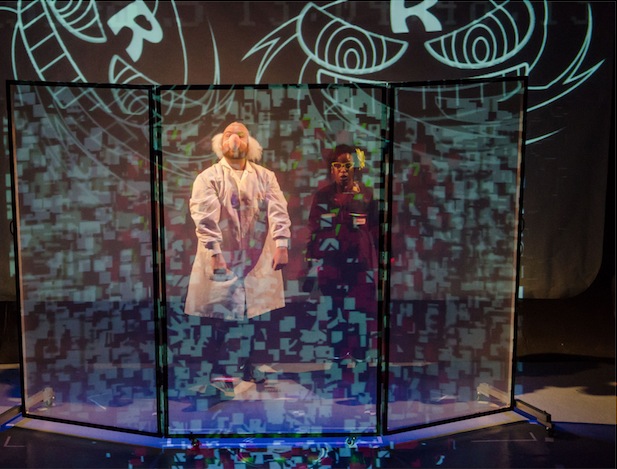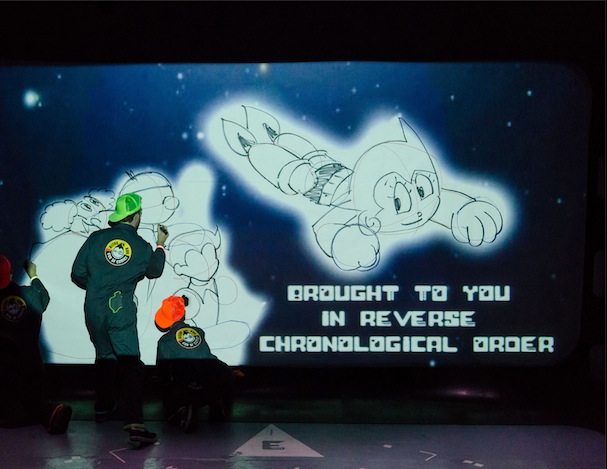Theater Review: Company One’s “Astro Boy” Rockets into an Eye-Popping Adventure
Company One’s production treats audiences to a seamless, eight-member ensemble who perform with a complicated bevy of multimedia effects that are so smoothly integrated into the action they elicit ooohs and aahs from the crowd.
Astro Boy and the God of Comics, written and directed by Natsu Onoda Power. Staged by Company One at the Boston Center for the Arts’ Plaza Theatre, Boston, MA, through Aug. 16.
By Terry Byrne
Live action, anime, documentary-style presentation, puppets and on-stage drawing all intersect in Astro Boy and the God of Comics, an eye-popping, 70-miniute adventure with a boy robot and his creator.
Within the cozy confines of the Boston Center for the Arts’ Plaza Theatre, Company One’s production treats audiences to a seamless, eight-member ensemble who perform with a complicated bevy of multimedia effects that are so smoothly integrated into the action they elicit ooohs and aahs from the crowd.
Playwright and director Natsu Onoda Power has turned her fascination with artist Osamu Tezuka into a celebration of his signature character and the artist himself. Although Astro Boy was a popular animated series in the 1960s, interest never waned in a boy robot who boasts both superpowers and sincere emotions and in 2009, an animated film based on Tezuka’s stories featured Nicolas Cage as the voice of Astro Boy’s creator.
The atmosphere on the Plaza Theatre stage flips effortlessly between the anime episodes and the creative effort required to make them happen. The eight performers plays a host of characters, but almost always return to the coverall uniforms that designate them as members of the Astro Boy production team. Gianella Flores captures all of the straightforward eagerness of the wide-eyed Astro Boy without an ounce of sarcasm, while the rest of the company – including Phil Berman, Jessica Chance, Amanda Ruggiero, Jeff Song, Robert St. Laurence, Kaitee Tredway and Clark Young — deliver characters, drawings, even sound effects with a sense of ease that is remarkable for the pace at which the episodes unfold. Projection designer Jared Mezzocchi should be listed as the ninth member of the ensemble because his contribution is so integral to the show.
Power takes an unconventional approach to storytelling, exploring the iconic Astro Boy and his creator, the “God of Comics,” through a series of 12 episodes, told in reverse chronological order, sort of. The effect begins with Astro Boy’s final mission, in which he saves humanity by sacrificing himself, and then winds back around to Tezuka, with snippets from his life and the many animators he trained. Occasionally, Power seems more enchanted by the opportunities to create charming effects than to tell a story, and the speed at which she paces the show allows only glancing comments about Tezuka’s themes of social justice (including an episode featuring the adoption of a Robot Constitution) and Robot Boy’s emotions (in another episode he drops to the ground sobbing in despair).

Phil Berman and Jessica Chance in Company One’s production of “Astro Boy & the God of Comics.” Photo: Liza Voll.
While lots of assumptions are made about how much the audience knows about Astro Boy, Power seems more concerned with the collaborative nature of creativity and the place where the imagined and the real worlds connect. In a frenzy of video clips, and changing scenes, cast members pick up artists’ markers and charcoal and, while we watch, illustrations emerge – it may be an incident from an Astro Boy episode or a moment from the life of Tezuka. The drawing is fast and furious but the impact is hypnotic and emotionally compelling.
Other moments require the performers to interact with video in precise but seemingly natural movements that never test our credulity. Other stylized scenes surprise us when they culminate with the construction of an automaton right before our eyes.
Astro Boy and the God of Comics is part of Company One’s XX PlayLab, which develops the work of selected women playwrights over an extended period of time. While Power’s nonlinear approach is both disorienting and delightful, the opportunity to see how theater can be transformed by the use of video is the real treat.
Terry Byrne has been writing about the arts for nearly two decades. She has an MFA in Playwriting from Boston University and is a Resident Scholar at Brandeis University’s Women’s Studies Research Center.
Tagged: anime, Astro Boy and the God of Comics, Company One, Natsu Onoda Power

